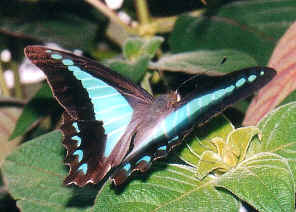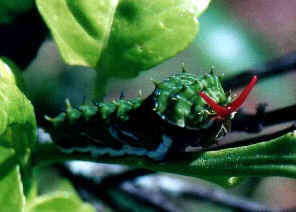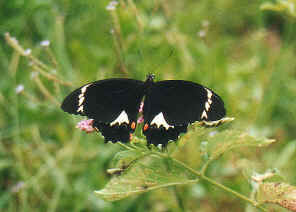|
|
Swallowtails - FAMILY PAPILIONIDAE

- Orchard Swallowtail caterpillar
- Most of the butterflies in this family are large in size and with brilliant colours. They are called Swallowtails because some of species have tailed hindwings. However, not all family members have tails, although most Swallowtails found in Brisbane have no tails.
- Caterpillars in this family have special method to defence against predators. They have a special fork-shaped organ osmeterium on their heads, when disturbed, will shoot out and produce the pungent smell that could make most predators avoid them.
- The Swallowtail caterpillar pupates by attaching itself to plant with tip of abdomen hooks to a silk pad and a silk supports the pupa at the middle.
- All Australia species belong to three tribes, Leptocircini, Papilionini and Troidini. subfamily PAPILIONINAE.
This page contains information and pictures about Swallowtail Butterflies - family PAPILIONIDAE in the Brisbane area, Queensland, Australia.
Tribe Leptocircini
- Blue Triangle Butterfly
- Graphium sarpedon, tribe Leptocircini, caterpillar 40mm, butterfly wingspan 80mm
- Blue Triangle butterflies fly very fast and are very hard to catch. When they are feeding on flowers, their wings are held vertically and constantly vibrate. The wings are black to dark brown in colour with large blue area in the middle of fore and hind wings. The underside pattern of the wings are similar except there are the red spots on the hind wings bottom. They are often seen in the bush on a sunny day during summer in Brisbane. More pictures and information here.
- Pale Triangle, Pale Green Triangle Butterfly

- Graphium eurypylus, tribe Leptocircini, wingspan 80mm
- The Pale Triangle is not as common as the Blue Triangle above in Brisbane. When they are feeding on flowers, their wings are held vertically and constantly vibrate. Notice that this species only have four legs.
- Orchard Swallowtail Butterfly, Large Citrus Butterfly or Orchard Butterfly.
- Papilio aegeus, caterpillar 50mm, wingspan male 120mm, female 140mm
- The female is similar, but browner, with a white patch on the forewings. To see more about Orchards Swallowtail Butterfly, please click here.
- Fuscous Swallowtail Butterfly


- Papilio fuscus, wingspan male 140mm
- The butterfly is easily mistaken as Orchard Swallowtail above but can be distinguished by its "tail". Their caterpillars look similar. The Fuscous Swallowtail is less common than the Orchard Swallowtail in Brisbane. Check this page for more information about this butterfly.
- Dingy Swallowtail



- Papilio anactus, caterpillar 40mm, butterfly wingspan 60mm
- The butterflies are also called Dainty Swallowtails. This is a small swallowtails butterflies, with white pattern on black and red patches. Their body is black in colour with yellow abdomen tip. We sometime see them flying alone on bushland. Dingy Swallowtail caterpillars are green in colour with yellow and white spots. They feed on citrus trees, include the Orange and lemon trees. Pupae are brown and look like a broken stick. More pictures and information please click here.
- Cressida cressida, wingspan male 70mm, female 60mm
- Clearwing Swallowtail Butterfly is the medium size swallowtail butterfly. The male and female look very different. Female is pale brown in colour, with scales on wings lost and become clear. The abdomen is black with orange colour between segments. Male is more colourful, with black dots on front clear wings. The hind wings are red, black and white in colour. The abdomen is red on black, the strong warning colours. Check this page for more information.
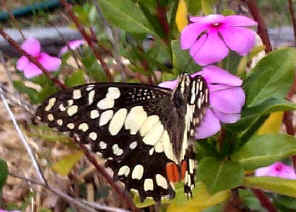
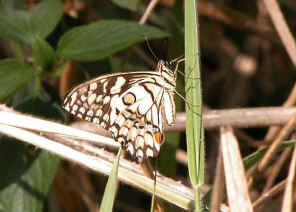

- Papilio demoleus, wingspan 80mm
- Chequered Swallowtails Butterflies are sometime seen visiting our backyard. They are large and beautiful, with a black and white pattern on fore and hind wings like a chequer board. On each hind wing, there are two eyes pattern spots. The one on the top is bluish-green in colour like the pattern of the peacock tails. The bottom eye spot is orange-red with blue eyebrow. On the black abdomen there are five white strips running along. Their caterpillars feed on Emu's Foot plants Psoralea tenax. Please check this page for more pictures and information.
- Reference:
- 1. Create More Butterflies - by Frank Jordan and Helen Schwencke, Earthling Enterprises, 2005, p20.
- 2. Australian Butterflies - Charles McCubbin, Nelson, Sydney, 1971. p140.
- 3. The Complete Field Guide to Butterflies of Australia - Michael F Braby, Australian National University, CSIRO 2004.
Tribe Papilionini
Tribe Troidini
This Tribe includes the Birdwing Butterflies. We tried very hard but had not seen one in the wild yet.

